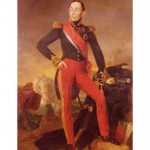In the afternoon of 18 June 1815, while Napoleon Bonaparte was fighting his last battle on the fields of Waterloo, Marshal Grouchy fought Thielmann’s Prussian army corps near the village of Wavre. The victory was his, but it meant nothing anymore since his master, the Emperor of the French, was defeated at Waterloo.
The Battle of Wavre was the final major military action of the Hundred Days campaign and the Napoleonic Wars. It was fought on 18-19 June 1815 between the Prussian rearguard under the command of General Johann von Thielmann and three corps of the French army under the command of Marshal Grouchy.
The march on Wavre, its influence on the result of the campaign, and the controversy to which Grouchy’s conduct on the day of Waterloo has given rise, are dealt at length in nearly every work on the campaign of 1815. Here it is only necessary to say that on the 17th Grouchy was unable to close with the Prussians, and on the 18th, though urged to march towards the sound of the guns of Waterloo, he chose instead to follow the Prussians along the route literally specified in his orders while the Prussian and British-Dutch armies united to crush Napoleon. On the 19th Grouchy won a smart victory over the Prussians at Wavre, but it was then too late. So far as resistance was possible after the great disaster, Grouchy made it. He gathered up the wrecks of Napoleon’s army and retired, swiftly and unbroken, to Paris, where, after interposing his reorganized forces between the enemy and the capital, he resigned his command into the hands of Marshal Davout.
The Battle of Wavre ended in a French victory with the Prussian rearguard in full retreat. To the Prussians the battle was a strategic victory, their rearguard had succeeded in holding off a superior French force long enough to allow Field Marshal Blücher to link up with Wellington’s Anglo-Dutch Army. Not only that, they had tied down some 33,000 French troops that could have otherwise taken part at Waterloo. Whilst Marshal Grouchy won at Wavre the victory was a hollow one as Napoleon’s main body of the L’Armée du Nord was defeated. If he had been more aggressive and gained his victory quickly Marshal Grouchy may have prevented Blücher from getting to Waterloo or even taken his own men there where they could have made all the difference.

